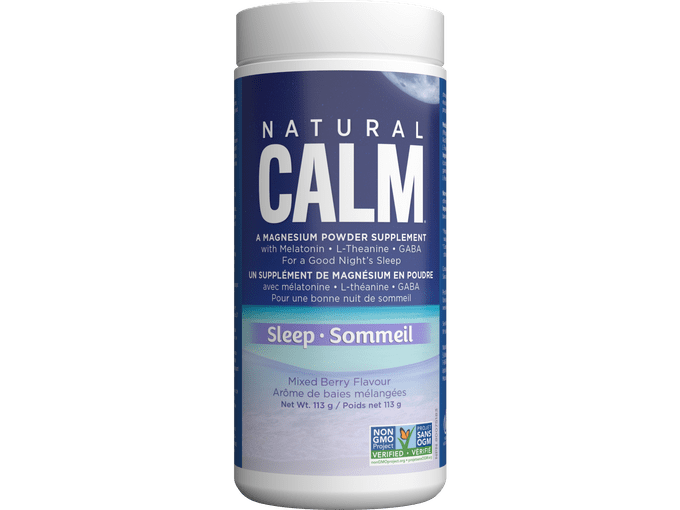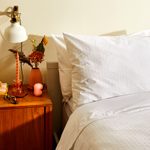Can Food Affect the Quality of My Sleep?
Two experts share what to avoid eating before bed and what to reach for instead.
By Sarah Laing
We’ve all heard the classic advice: Don’t eat cheese before bed (unless you’re into strangely vivid dreams). Do drink a glass of warm milk (cow’s milk only—no dairy alternatives here). But can food really impact your sleep this much? It turns out that those old wives may have been onto something.
In fact, according to Alanna McGinn, a certified sleep coach and founder of Good Night Sleep Site, what you’re eating—and when—is one of the first things she’ll bring up if you come to her for a consultation. “Our bodies can really only do one thing at a time,” she explains. “If we eat right before we go to bed, our body is going to be too busy digesting that meal to get that good quality sleep.” It’s the same reason you aim for a nottoo-hot-or-too-cold bedroom, so your body doesn’t spend the night on thermoregulation. Ditto drinking alcohol right before bed, adds McGinn. “Yes, it might help you fall asleep, but your body [will be working to process] the alcohol, so you’re not going to get proper sleep.” Cue the dreaded 2 a.m. wake-up laden with existential angst.
To avoid this, she recommends eating your last meal four hours before bedtime, and combining that with other sensible sleep-enhancing behaviour: reducing stress, tackling any underlying medical issues that could be hampering those zzzs, and practicing good sleep “hygiene,” like moving your body throughout the day, creating a restful (device-free) bedtime routine and going to bed at a consistent time each night.
“Everything goes hand-in-hand, because when we’re not sleeping well, our bodies tend to crave more sugar and carbs, and we’re not able to metabolize food as well,” McGinn says. She’s referring to the way our body looks for quick sources of energy during the day to compensate for a lack of sleep, which leads to spiking blood sugar and a pattern of hit-crash-hit-crash all day long. “When we’re not eating well, that then can affect how we sleep,” McGinn says. This can easily become a vicious cycle: You’re mainlining candy for energy because you’re tired, and you’re tired because that candy is linked to insomnia, just like caffeine. “Of course we don’t drink coffee right before bed, but people don’t understand that even having a cup of coffee after noon can affect your sleep.” Caffeine is in pop, chocolate and black tea, too.
The good news? Food doesn’t solely hamper your sleep—it can also be used to enhance it. Just ask Abbey Sharp, a registered dietitian and self-professed insomniac. “There are some foods that can have mild sedative properties,” says Sharp. “Generally speaking, though, it comes down to eating patterns more than specific foods having sleepy-time properties.”
For Sharp, that ideal pattern is eating two food groups in a strategic way. “Having [certain] carbohydrates a few hours before bedtime can be an effective way to help you doze off,” she says, pointing to several studies that indicate rice, in particular, could be good for this. One Japanese study compared folks who ate noodles, bread and rice before bed, and researchers found that rice was associated with better sleep, bread made no difference and noodles actually led to poorer quality sleep. The theory is that this is because of white rice’s high glycemic index, which pings your body to produce sleepiness-inducing serotonin. All white rice can help you snooze, but one study in the American Journal of Clinical Nutrition found that high-GI jasmine performed best in this regard.
“A little bit of carbs at dinner is advantageous, because it stimulates serotonin and dopamine, and gets us into that mood for relaxation,” Sharps explains. (Serotonin is also the brain chemical that helps you stay asleep for longer.) The key, however, is pairing them with protein, which helps slow down the absorption of the carbohydrates and keeps us feeling fuller for longer.
“If you are having white rice, then tofu or chicken is going to slow down that blood sugar response so you don’t get any of those dips during the night,” says Sharp. (Low blood sugar at night, aka hypoglycemia, can cause sleep disruptions like profuse sweating, nightmares, restlessness and feeling grumpy when you wake up.) “And it’s going to keep you full during the night, which is important for sleep, since waking up because you’re hungry is the worst.” For this reason, Sharp says a strategic bedtime snack can be helpful for some people.
“I like to focus on grains, like wholegrain bread or oatmeal, to reduce the risk of insomnia,” she says. “And then adding lots of those high-fibre fruits like pears and berries.” Research links a highfibre diet with more time in “slow wave” sleep, which is the deep sleep stage that’s essential for everything from memory to your immune system and just waking up feeling refreshed.
Sharp also recommends incorporating kiwis and cherry juice, both of which have some research suggesting they can help improve sleep quality. Kiwis contain that all-important serotonin, and a small study in 2011 showed that eating two before bed improved total sleep time by 13 percent.
Sour or tart cherries, particularly when in concentrated juice form, contain melatonin, a key hormone when it comes to regulating your sleep cycle. In fact, one (very small) study gave eight insomniac adults 8 ounces of tart cherry juice twice a day for two weeks. During this time, they reported better sleep quality—an average of 84 minutes of extra sleep per person, per night.
Sharp’s also a fan of incorporating dairy before bed, contrary to the old wives’ tale about cheese. In addition to protein, dairy contains calcium and magnesium, both important for good sleep. You could opt for cottage cheese, Sharp’s personal favourite. “It’s rich in something called casein protein,” she says. “Unlike straight-up whey protein, casein breaks down much slower so it keeps you fuller all through the night.”
More than anything, Sharp is big on the placebo effect when it comes to food helping you sleep. “All of these tips, in my experience, are more ritualistic than anything,” she says. “Any ritual that feels good to you, whether it’s taking a bath or having a specific snack, is going to serve as a cue to help you get into that sleepy stage a little faster.” The most important thing is to do what works for you to reap the benefits of restorative sleep.

From our partner:
Should I try a nightcap?
Perhaps when you were a kid and had trouble falling asleep, your parents would give you a glass of warm milk for a nightcap. That’s because cow’s milk contains tryptophan, which helps boost the body’s production of melatonin, a hormone that signals to your body it’s time for bed. Now, let us introduce you to the adult version of a nightcap: A glass of fizzy, fruity water with magnesium, also known as Natural Calm.
Natural Calm is a sleeppromoting supplement that comes in the form of flavoured powder to be mixed into a cup of hot water before bed. Its beloved by Canadians (including competitive swimmer Penny Oleksiak) for being able to quiet a racing mind, relax muscles and boost feelings of sleepiness thanks to its star ingredient, magnesium citrate. It’s formulated with other sleep-inducing ingredients, too: Magnesium glycinate promotes relaxation, GABA helps calm the nervous system and lulls anxiety, and melatonin helps you fall asleep fast and stay asleep.
Incorporating Natural Calm into your wind-down routine is easy. About 30 minutes before bed, after you close your laptop and put your phone on charge, scoop a spoonful of Natural Calm into a cup of boiling water. Stir it together, and it’ll fizz right up. Once it settles, it’s ready to drink. It won’t taste chalky, it won’t be lumpy, and it won’t boast a fake-tasting sweetness. Natural Calm tastes like soothing fruity tea, without any added artificial ingredients or sugar. Continue with your skin care routine and other pre-bed rituals, and you’ll feel your body calming itself down, ready to doze off as soon as your head hits the silk pillowcase.
For more information, visit naturalcalm.ca.





